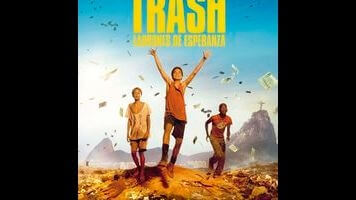Trash’s heaviness smothers a slick Brazilian crime story

The violent coming-of-age drama Trash has the pedigree of an Oscar-contender: directed by Stephen Daldry, a Best Director nominee (for Billy Elliot, The Hours, and The Reader); written by Richard Curtis, a Best Original Screenplay nominee (for Four Weddings And A Funeral); and starring Rooney Mara (one Best Actress nomination) and Martin Sheen (no Oscars, but a slew of Emmy and Golden Globe nods) as social activists working in one of Rio’s poorest neighborhoods. But while Trash is showing up in select U.S. theaters—and, perhaps tellingly, on VOD—in the thick of awards season, it arrives with little fanfare, nearly a year after it’s played in other global markets. That’s usually a sign that something’s wrong with the picture.
It doesn’t take too long to figure out the problem. Trash is based on Andy Mulligan’s popular young-adult novel, which follows three kids who scrounge through the garbage dump in an unnamed city, and get in trouble with the authorities when they find a wallet containing seemingly random notes, pictures, and objects. The book is meant to teach teenage readers about life in third world countries, while also telling an entertaining, action-packed mystery story. Daldry and Curtis’ Trash gets hung up on the “teaching” part—looking to inform the well-off about the struggles of Rio slum-dwellers—and for too long forgets that Mulligan’s novel provided a pretty good plot.
Mara and Sheen don’t have a major presence in the movie, beyond offering a couple of familiar faces for non-Brazilian viewers to latch onto. The former plays a teacher and the latter a priest, and their characters mostly serve to mentor the main trio: Rafael (Rickson Tevis), Gardo (Eduardo Luis), and Rat (Gabriel Weinstein). The boys come into possession of the wallet early in the film, but don’t really know what they have or why the cops are suddenly turning the favelas upside-down. So much of Trash’s first hour consists of scene after scene of poverty and police brutality, loosely connected by the citywide search for one significant piece of garbage.
The second hour picks up the pace, as the kids start piecing together the wallet’s secrets, making connections that expose a pattern of political corruption. There’s a whiz-bang quality to Trash’s back half, which plays more like an adaptation of juvenile fiction, and not the R-rated heavy sigh that so much of the rest of this movie ends up being. When Trash finally reaches its powerful climactic image—a shot of the boys standing just above the dump, representing the triumph of the discarded—the whole project almost justifies its existence.
Yet even after that scene, Trash goes on for 10 more minutes, piling on more of Antônio Pinto’s oppressive score, more of Adriano Goldman’s flashy cinematography, and more of Daldry’s general relentlessness. Trash is meant to appeal to arthouse audiences who liked City Of God, Slumdog Millionaire, and other youth-oriented underdog tales set in squalid conditions. But while once upon a time Daldry made a very good movie like Billy Elliot, here he lets what should’ve been an efficient little thriller get stymied by an excess of style, and the weight of self-importance.